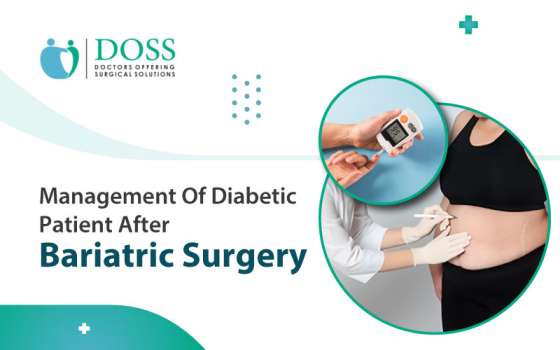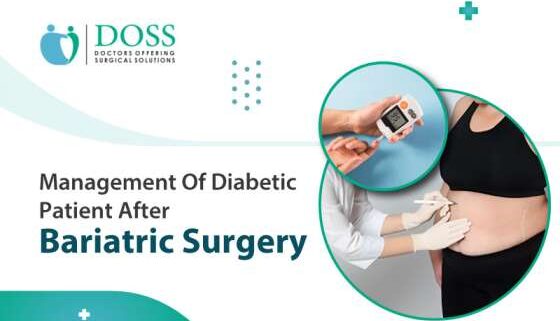Management Of Diabetic Patient After Bariatric Surgery
Blog
Embarking on the journey of post-bariatric surgery can be transformative, especially for those living with diabetes. Let’s delve deeper into the impact of bariatric surgery on weight loss and overall health, with a specific focus on diabetes management.
By understanding the nuances of navigating the post-bariatric surgery landscape, you are taking a significant step towards a healthier tomorrow.
Understanding the Transformative Journey
Bariatric surgery, a surgical procedure that promotes weight loss by altering the digestive system, has shown remarkable success in helping individuals achieve their health goals.
It’s not just about shedding pounds; it’s about a holistic improvement in quality of life.
Understanding how bariatric surgery impacts your body and overall health empowers patients to make informed decisions about their treatment options. This knowledge is a vital tool in effectively managing diabetes post-surgery.
Must Watch this Video
The Significance of Diabetes Management After Bariatric Surgery
Obesity and diabetes are two interlinked conditions that pose significant health risks. Bariatric surgery offers a beacon of hope for improvement or even resolution of diabetes symptoms.
The weight loss resulting from bariatric surgery can significantly improve insulin sensitivity, leading to better blood sugar control.
But it’s vital to remember that diabetes management remains a crucial aspect even post-surgery, with tailored plans devised to meet individual needs.
Also, Read- How does bariatric surgery affect diabetes?
Regain Control of Your Health
Are you a diabetic patient who has undergone bariatric surgery? Our specialized team at Doss India is dedicated to helping you effectively manage your diabetes post-surgery.
Visit NowBlood Sugar Control
Maintaining optimal blood glucose levels is vital for individuals with diabetes. Implementing guidelines for monitoring and controlling blood sugar levels becomes even more critical following bariatric surgery.
Changes in insulin sensitivity can impact blood sugar levels, necessitating adjustments in medication dosages and lifestyle modifications. Regular self-monitoring of blood glucose (SMBG) and periodic HbA1c tests can help keep track of blood sugar control.
Dietary Guidelines for Post-Bariatric Surgery Patients
A balanced and nutrient-rich diet is essential for postoperative health. For diabetic patients, specific dietary recommendations can help manage blood sugar levels effectively.
These include portion control, choosing low glycemic index foods, and maintaining regular meal timings. Integrating these dietary changes into the post-surgery lifestyle can contribute to long-term success in diabetes management.
Also, Read- Is bariatric surgery good for diabetes?
Medication Adjustments and Considerations
Following bariatric surgery, adjustments in diabetes medications may be necessary. This includes modifications to insulin dosages and potential changes to oral medications.
Monitoring medication needs as weight loss progresses ensures optimal diabetes management throughout the post-surgery journey. Regular consultation with an surgeon can help to adjust medication doses appropriately.
Follow-up Care
Regular follow-up appointments play a crucial role in post-bariatric surgery care. These appointments allow surgeons and dietitians, to monitor overall health, track weight loss progress, and assess diabetes management.
They also provide an opportunity to address any concerns or complications that might arise post-surgery. A collaborative care approach ensures comprehensive support for patients as they navigate the post-surgery landscape.
Lifestyle Changes for Long-Term Success
Incorporating exercise into the postoperative routine is essential for maintaining weight loss and supporting overall health. Regular physical activity aids in controlling blood glucose levels, reducing insulin resistance, and promoting cardiovascular health.
Building and sustaining a healthy lifestyle can contribute to long-term success in weight management and diabetes control. Addressing behavioral changes and psychological aspects of post-surgery life is equally important for holistic well-being.
Exploring the Possibility of Diabetes Remission
Medical studies have shown promising results regarding diabetes remission after bariatric surgery. Understanding the factors that influence remission or improvement can help set realistic expectations.
These factors include duration of diabetes, preoperative glycemic control, and weight loss surgery. Patients should partner with their surgeon to devise personalized plans and ensure ongoing monitoring for sustained results.
Potential Complications and Warning Signs
As with any surgical procedure, there are potential complications associated with both diabetes and bariatric surgery. These include surgical site infections, dumping syndrome, nutritional deficiencies, and changes in mental health.
It is crucial to be aware of warning signs that require immediate medical attention. Postoperative vigilance, coupled with regular check-ups, can help mitigate risks and ensure a smooth recovery.
Conclusion
The post-bariatric surgery landscape offers hope and opportunities for those living with diabetes. By prioritizing expert insights, personalized care, and lifestyle adjustments, individuals can navigate this transformative journey towards better health.
Remember, you are not alone on this path. With the support and guidance of surgeons and dietitians, you can achieve optimal diabetes management and embrace a healthier tomorrow.


 +919011100010
+919011100010 


